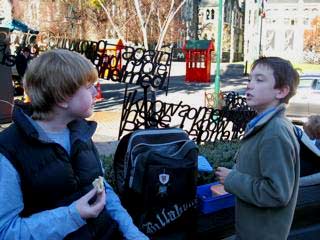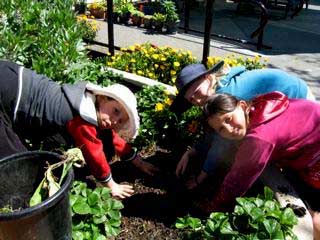Maria Montessori’s vision for Primary education, which she described as Cosmic Education, can be described today as holistic education: the importance of providing a coherent, overall context for each area of study by engaging the child’s imagination in the evolutionary narrative of the universe and of life, and showing how the bigger picture incorporates maths, language, science, history, geography and the arts, and their intrinsic interrelationship.
Nova’s Primary programme is based on the very specific needs and characteristics of children from 6 to 13 years of age.
Characteristics of the Primary Child
Reason and Imagination
“Imagination is the eye that lets the child see back into the past and on into the future.” – Maria Montessori
Primary age children no longer simply want to know ‘What is that?’ They now need to know ‘why’ and ‘how’ and the way it all fits together. They are capable of using both reason and imagination to explore abstractions beyond the concrete here and now.
Exploring Society
Children between the ages of three and six learn about themselves and the world through the ‘absorbent mind’. Children from six to twelve continue this exploration of the individual , but it is in relation to the larger society. The child might think, ‘I want to understand what I cannot see, be part of the world I have not experienced’. Primary children are very social and interested in such issues as co-operation, fairness and decision making.
A Need for Togetherness

The Primary child seldom works alone. This is the age of groups and clubs – what Montessori called the ‘herd instinct’. Children want to do what others are doing. They explore friendships as well as the rules of society.
Group lessons with corollary work and discussions are important parts of the learning process. As they collaborate on projects, children learn to identify and share their particular strengths and skills. Various social skills are necessary to make these collaborations work effectively .Through activities that build group cohesion and resolve conflicts, the children learn skills and tools that encourage the art of co-operative peace making.
Exploring Right and Wrong
Primary children question and love to make rules. Although they may not always keep the rules themselves, they are constantly observing to make sure that everyone is following them. Teachers assist the child in sorting out how to act in different situations, to learn basic rules of courtesy and to understand what is considered right and wrong by society.
Discipline and Problem Solving
Our approach to discipline is to help the children learn that they are responsible for what they do and that their actions have natural consequences. Whether the problem involves two people or the whole class, the teachers help the children learn how to solve problems on their own.
The Curriculum
Structure

Maria Montessori called the Primary curriculum Cosmic Education because its goal is to expose the child to the whole range of human knowledge in an integrated approach to learning set into the largest context possible.
Contextual learning is the foundation for deep understanding. The context for the elementary curriculum is established in an overview of the history of the universe. As they study ancient civilisations the children discover that all aspects of knowledge including mathematics, language, history, botany, geography, music and art developed the basic human needs. This understanding fosters a love for learning and eagerness to take their place as contributing members of the community.
Content
During the period from six to nine years most lessons are primarily presented through the use of Montessori materials and exercises.
The transition to more abstract thinking and the reliance on books and other research materials begins at this level and continues through the older Primary years. The teacher and student go over lessons and assignments together. Our goal is to help students assess their own learning. Parent teacher interviews are held regularly throughout the year.
Mathematics
Mathematics is taught as a process of comprehension through visualised abstractions. This is the essential reason for the use of didactic apparatus, as the children spontaneously understand the process. A child might say, ‘ I can do the checkerboard without the checkerboard’ – meaning that he or she can multiply abstractly without the dependence on the materials. During the Primary years the children concentrate on basic operation, the decimal system, fractions and geometry through the use of hands on, manipulative materials. Some concepts of algebra, such as squaring and cubing are also explored.
Language Arts
Language arts emphasise spelling, grammar, and sentence analysis. Reading skills acquired at the three to six level are continually enhanced through direct applications in the classroom such as literature, poetry and book discussion groups.
Earth Systems Science
Earth systems science (geography, earth science, ecology and economics) is an integrated approach to studying humanity’s relationship to the natural world. This is uniquely a Nova development as a further articulation of Montessori’s plans developed in the middle of last century.
Gardening

Gardening and caring for life is an essential to the Nova experience. Montessori say, “Solicitous care for living things affords satisfaction to one of the liveliest instincts of the (young person’s) mind. Nothing is better calculated than this to awaken an attitude of foresight.” Permaculture extends the practice of gardening to an all encompassing context for integrating human living practices. It is an illustration of cosmic education.
Research Skills and Critical Thinking
Are introduced to enable independent and group study. In this process, the library, computer and other reference materials become an important resource.
Children are encouraged to go beyond the limits of the classroom to seek answers to their questions from resources in the community including libraries, museums and knowledgeable experts. Research results may be communicated through written reports, poetry, artwork, demonstrations and dramatisations.
During the Primary years the children begin to take responsibility for organising and monitoring their own time. Formal lessons plant the seeds for group research projects and, especially for the older Primary years, teachers help children organise their studies within a time framework. Work diaries and other techniques are introduced to develop responsibility. These experiences become the foundation for self motivated and disciplined study.